Las nociones de simpatía y de valor en paralelo. El problema de la sociedad pequeña y la sociedad universal en Adam Smith
Publicado 2018-06-08
Cómo citar
Resumen
El presente trabajo se propone mostrar los puntos de contacto existentes entre el desarrollo de la noción de simpatía en La Teoría de los Sentimientos Morales y el desarrollo de la noción de valor en La Riqueza de las Naciones. En cada una de sus dos obras (La Teoría de los Sentimientos Morales y La Riqueza de las Naciones), Smith elige a la noción de simpatía y a la noción de valor como principios fundamentales para la armonía de la conducta social y del sistema de intercambio mercantil, respectivamente. Pero, en ambos casos, esos principios rigen solamente en sociedades pequeñas y no en la sociedad de carácter universal que asomaba ya en la época smithiana, donde el individuo moderno ya no tiene lazos de afecto con todos los miembros de la sociedad y, asimismo, desconoce los esfuerzos necesarios para producir todas las mercancías necesarias para su vida cotidiana.
Referencias
- Alvey, J. E. (1999). A short history of economics as a moral science. Journal of markets and morality, 2(1).
- Aspromourgos, T. (2013). On the origins of classical economics: distribution and value from William Petty to Adam Smith. Routledge.
- Broadie, A. (ed.) (2003) The Cambridge companion to the Scottish Enlightenment, Cambridge: Cambridge University Press.
- Campbell, R. R. H., & Skinner, A. S. (Eds.). (1982). The Origins and nature of the Scottish Enlightenment: essays. J. Donald.
- Clark, C. M. (1990). Adam Smith and society as an evolutionary process. Journal of Economic Issues, 24(3), 825-844
- Cremaschi, S. (2009). ‘Newtonian Physics, Experimental Moral Philosophy and the Shaping of Political Economy. Open Economics: Economics in relation to other disciplines. Routledge, 73-94.
- Dow, A., & Dow, S. (2015). Scotland. Routledge Handbook of the History of Global Economic Thought. Routledge.
- Ekelund, R. B., y Hébert, R. F. (1992). Historia de la teoría económica y de su método, McGraw-Hill.
- Fitzgibbons, A. (1997). Adam Smith's system of liberty, wealth, and virtue: The moral and political foundations of the wealth of nations. OUP Catalogue.
- Forman-Barzilai, F. (2005). Sympathy in Space (s) Adam Smith on Proximity. Political Theory, 33(2), 189-217.
- Griswold, C. L. (1999). Adam Smith and the virtues of enlightenment. Cambridge University Press.
- Haakonssen, K. (1989). The science of a legislator: the natural jurisprudence of David Hume and Adam Smith. Cambridge University Press.
- Haakonssen, K. (Ed.). (2006). The Cambridge Companion to Adam Smith. Cambridge University Press.
- Klaver, C. C. (2003). A/Moral Economics: Classical Political Economy and Cultural Authority in Nineteenth-Century England. Ohio State University Press.
- Megill, A. D. (1975). Theory and Experience in Adam Smith. Journal of the History of Ideas, 36(1), 79-94.
- Negishi, T. (2014). History of economic theory (Vol. 26). Elsevier.
- Perdices de Blas, L.. (2008). Historia del pensamiento económico. Síntesis.
- Raphael, D. (1979) ‘Adam Smith: Philosophy, Science and Social Science’, in S. Brown (ed.) The
- Philosophers of the Enlightenment , Brighton: Harvester, 77–93.
- Roncaglia, A. (2006). The wealth of ideas: a history of economic thought. Cambridge University Press.
- Rothbard, M. N. (1995). An Austrian perspective on the history of economic thought. Ludwig von Mises Institute.
- Rothschild, E. (2001). Economic sentiments. Harvard University Press.
- Sakamoto, T., & Tanaka, H. (Eds.). (2005). The rise of political economy in the Scottish enlightenment. Routledge.
- Schumpeter, J. A. (1954). History of economic analysis. Psychology Press.
- Simon, F. (2013). Adam Smith and the Law. The oxford handbook of Adam Smith. OUP Oxford
- Skinner, A. S. (2012). Adam Smith: Theory and Policy. Handbook of the History of Economic Thought (pp. 161-171). Springer New York.
- Smith, A. (1976). An Inquiry into the Nature and Causes of the Wealth of Nations RH Campbell & A. Skinner Indianapolis: Liberty Classics
- Smith, A. (2002). The theory of moral sentiments. Cambridge texts in the history of philosophy.
- Smith, A. (2004). La teoría de los sentimientos morales (versión española y estudio preliminar de Carlos Rodríguez Braun), Editorial Alianza, Madrid.
- Thomsom, H. F. (1965). Adam Smith's philosophy of science. The Quarterly Journal of Economics, 212-233.
- Walras, L. (1874). Éléments d'économie politique pure; ou, Théorie de la richesse sociale. L. Corbaz & Cie Éditeurs, Lausanne.
- Wennerlind, C. (2007). David Hume as a political economist. A History of Scottish Economic Thought. Routledge
- Werhane, P. H. (2006). Adam Smith’s Legacy for Ethics and Economics. Review of Business and Economics, 51(2), 199-212.






